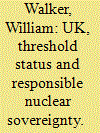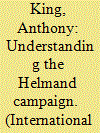|
|
|
Sort Order |
|
|
|
Items / Page
|
|
|
|
|
|
|
| Srl | Item |
| 1 |
ID:
095069


|
|
|
|
|
| Publication |
2010.
|
| Summary/Abstract |
With a strategic defence review expected to begin in 2010, this article reflects upon the history of the review in British defence policy and planning. The authors argue that for decades successive defence reviews have followed a process in which policy development moves through four phases: failure, inertia, formulation and misimplementation. This has resulted in a cycle of defence reviews that have proved to be incomplete and unsustainable: a cycle in which each review leaves so much unfinished business that another radical reappraisal of defence policy is soon thought necessary, and a cycle from which a succession of governments have so far proved unable or unwilling to escape. The article suggests that the strategic defence (and security) review promised for the next parliament is in danger of continuing this pattern of policy deficiency. The authors contest that this need not be the case. With a close understanding of the pattern of past reviews it should be possible for the 2010 review finally to break the mould and produce a coherent and above all sustainable defence policy and strategy.
|
|
|
|
|
|
|
|
|
|
|
|
|
|
|
|
| 2 |
ID:
095067


|
|
|
|
|
| Publication |
2010.
|
| Summary/Abstract |
The UK faces a pressing defence dilemma. The declaratory goals of defence policy are struggling to match the demands made by operational commitments and the financial and organizational capacities. The article examines how and why this situation has come about. While recognizing that existing calls for higher defence spending, reform of the Ministry of Defence, efficiency gains or a renewal of the so-called military covenant between the military and society may address discrete elements of the defence dilemma in Britain, it argues that current problems derive from a series of deeper tensions in the nexus of British defence more widely defined. These include a transnationalization of strategic practice, in ways that both shape and constrain the national defence policy process; the institutional politics of defence itself, which encourage different interpretations of interest and priority in the wider strategic context; and finally the changing status of defence in the wider polity, which introduces powerful veto points into the defence policy process itself. It argues that while a series of shocks may have destabilized existing policy, prompted ad hoc organizational adaptation in the armed forces and led to incremental cost saving measures from the government, a 'dominant crisis narrative'-in the form of a distinctive and generally agreed programme of change-has yet to emerge. The article concludes by looking forward to a future strategic defence review, highlighting the critical path dependencies and veto points which must be addressed if transformative change in British defence is to take place.
|
|
|
|
|
|
|
|
|
|
|
|
|
|
|
|
| 3 |
ID:
095064


|
|
|
|
|
| Publication |
2010.
|
| Summary/Abstract |
One of the underlying assumptions of the contemporary debate over Afghanistan is that counterterrorism objectives can be achieved through counterinsurgency methods. The recent decision by President Barack Obama to deploy 30,000 extra troops to Afghanistan is premised on the idea that to disrupt Al Qaeda and prevent it from forming training camps in Afghanistan it will be necessary to first reverse the momentum of the Taleban insurgency. This approach-which places the US and UK on the offensive to disrupt terrorist plots before they arrive on their shores-assumes that the threats from Al Qaeda and the Taleban are intertwined and thus the strategy of response must seamlessly comprise elements of counterterrorism and counterinsurgency. In fact, counterterrorism and counterinsurgency are very different-often contradictory-models of warfare, each with its own associated assumptions regarding the role of force, the importance of winning support among the local population, and the necessity of building strong and representative government. Rather than being mutually reinforcing, they may impose tradeoffs on each other, as counterterrorism activities may blunt the effectiveness of counterinsurgency approaches and vice versa. The last four years in Afghanistan provide evidence that when employed in the same theatre counterterrorism and counterinsurgency strategies can offset one another. To be in a position to begin the withdrawal of US troops before July 2011, the Obama administration will need to find a way to manage the tradeoffs between its counterterrorism and counterinsurgency strategies in Afghanistan.
|
|
|
|
|
|
|
|
|
|
|
|
|
|
|
|
| 4 |
ID:
095066


|
|
|
|
|
| Publication |
2010.
|
| Summary/Abstract |
At the heart of the 'special relationship' ideology, there is supposed to be a grand bargain. In exchange for paying the 'blood price' as America's ally, Britain will be rewarded with exceptional influence over American foreign policy and its strategic behaviour. Soldiers and statesman continue to articulate this idea. Since 9/11, the notion of Britain playing 'Greece' to America's 'Rome' gained new life thanks to Anglophiles on both sides of the Atlantic. One potent version of this ideology was that the more seasoned British would teach Americans how to fight 'small wars' in Iraq and Afghanistan, thereby bolstering their role as tutor to the superpower. Britain does derive benefits from the Anglo-American alliance and has made momentous contributions to the wars in Afghanistan and Iraq. Yet British solidarity and sacrifices have not purchased special influence in Washington. This is partly due to Atlanticist ideology, which sets Britain unrealistic standards by which it is judged, and partly because the notion of 'special influence' is misleading as it loses sight of the complexities of American policy-making. The overall result of expeditionary wars has been to strain British credibility in American eyes and to display its lack of consistent influence both over high policy and the design and execution of US military campaigns. While there may be good arguments in favour of the UK continuing its efforts in Afghanistan, the notion that the war fortifies Britain's vicarious world status is a dangerous illusion that leads to repeated overstretch and disappointment. Now that Britain is in the foothills of a strategic defence review, it is important that the British abandon this false consciousness.
|
|
|
|
|
|
|
|
|
|
|
|
|
|
|
|
| 5 |
ID:
095070


|
|
|
|
|
| Publication |
2010.
|
| Summary/Abstract |
Is the British civil-military contract strained to breaking point? The contemporary portrayal of British civil-military relations is bleak, with academics, politicians, the media and military charities arguing that military-societal relations are in urgent need of repair. Through assessing the extent to which the reciprocal expectations of the armed forces and the British public are realized, this article will argue that the moral contract, although under stress, is not breaking. Underlying social trends and the use of doctrinal concepts such as the military covenant have, combined with recent operations in Iraq and Afghanistan, altered the expectations of both sides causing tensions within military-societal relations. Yet, while the armed forces do harbour unrealized expectations of the British public who are unwilling or unable to support the use of the military in recent conflicts, neither the public nor the military is so disillusioned with the performance of the other for the relationship to be described as breaking or broken.
|
|
|
|
|
|
|
|
|
|
|
|
|
|
|
|
| 6 |
ID:
095074


|
|
|
|
|
| Publication |
2010.
|
| Summary/Abstract |
Is there a conflict between the Alliance's original and enduring purpose of collective defence and its post-Cold War crisis management functions? This is an ill-framed debate, because the home base must be secure in order to support expeditionary power projection. The allies have, moreover, moved away from a static, reactive, and territorial concept of collective defence towards a more 'proactive' and 'anticipatory' approach. Some experts have even referred to a 'deterritorialization' of collective defence. Other issues also illustrate the changing dimensions of collective defence-missile defence, cyber warfare, space operations, the risk of state-sponsored terrorism involving weapons of mass destruction, political-military dynamics in the Middle East and the Asia-Pacific region, and the risk of a non-Article 5 operation becoming a collective defence contingency. Despite disagreements on how to pursue shared goals, the allies may yet demonstrate that they have the vision and political will to meet the new challenges. The question of the Alliance's 'level of ambition' in capabilities is inseparable from that of its agreed purposes and burden-sharing to achieve them.
|
|
|
|
|
|
|
|
|
|
|
|
|
|
|
|
| 7 |
ID:
095073


|
|
|
|
|
| Publication |
2010.
|
| Summary/Abstract |
Recent analysis on the prospects for achieving a world free of nuclear weapons has tended to focus on a set of largely realist strategic security considerations. Such considerations will certainly underpin future decisions to relinquish nuclear weapons, but nuclear disarmament processes are likely to involve a more complex mix of actors, issues and interests. The article examines this complexity through a sociological lens using Britain as a case-study, where relinquishing a nuclear capability has become a realistic option for a variety of strategic, political and economic reasons. The article examines the core ideational and organizational allies of the UK nuclear weapon 'actor-network' by drawing upon social constructivist accounts of the relationship between identity and interest, and historical sociology of technology analysis of Large Technical Systems and the social construction of technology. It divides the UK actor-network into three areas: the UK policy elite's collective identity that generates a 'national interest' in continued deployment of nuclear weapons; defence-industrial actors that support and operationalize these identities; and international nuclear weapons dynamics that reinforce the network. The article concludes by exploring how the interests and identities that constitute and reproduce the 'actor-network' that makes nuclear armament possible might be transformed to make nuclear disarmament possible. The purpose is not to dismiss or supplant the importance of strategic security-oriented analysis of the challenges of nuclear disarmament but to augment its understanding by dissecting some of the socio-political complexities of nuclear disarmament processes.
|
|
|
|
|
|
|
|
|
|
|
|
|
|
|
|
| 8 |
ID:
095071


|
|
|
|
|
| Publication |
2010.
|
| Summary/Abstract |
As the states parties to the nuclear Non-Proliferation Treaty (NPT) plan for the May 2010 review conference, they are faced with recurring political challenges that call into question the long-term sustainability of the presently constituted non-proliferation regime, notwithstanding the important role the NPT and its related institutions have played in slowing the pace of proliferation for four decades. Even if the review conference is deemed a success, its outcome is unlikely to address the regime's core structural weaknesses and normative contradictions. Frustration with the continuing status and benefits accorded to nuclear-armed states outside as well as within the NPT, will continue to diminish confidence in the effectiveness of traditional non-proliferation and deterrence practices. The progressive reframing of security in terms of creating a world without nuclear weapons may be little more than rhetoric for some leaders, but it has widespread public support. A growing number of governments are now expressing interest in new approaches and steps, including consideration of a nuclear weapons convention as a practical objective to work towards. The article discusses the challenges and options for the non-proliferation regime and concludes that efforts to halt future proliferation will increasingly focus on reshaping the norms and rules to pave the way for negotiating a new nuclear security compact, based on a verified process to prohibit and eliminate the possession as well as the use of nuclear weapons.
|
|
|
|
|
|
|
|
|
|
|
|
|
|
|
|
| 9 |
ID:
095075


|
|
|
|
|
| Publication |
2010.
|
| Summary/Abstract |
In the wake of the crippling cyber attack on Estonia's internet infrastructure in 2007, several world powers announced their intentions to deploy offensive capabilities in cyberspace. As cyberspace evolves from a technology enthusiast's domain into a global economic and military 'battlespace', the likelihood of a major interstate cyber conflict increases significantly. The article discusses why now may be the time for international society to begin working towards ratification of a global cyber treaty. It begins by reviewing the converging forces responsible for making cyberspace a dynamic zone of political and economic competition among states. It then examines the central debates surrounding how the laws of armed conflict may or may not apply to cyber warfare. The article concludes by arguing that given proper political support, a multilateral cyber treaty could prove an effective international instrument in preventing cyberspace from becoming the default platform for states seeking to settle conflicts outside the reach of customary international law and diplomacy.
|
|
|
|
|
|
|
|
|
|
|
|
|
|
|
|
| 10 |
ID:
095072


|
|
|
|
|
| Publication |
2010.
|
| Summary/Abstract |
The example of the UK is used to explore two linked ideas relevant to the current international politics of nuclear weapons: that of the threshold state, whereby a state moves from possession to non-possession of weapons rather than in the opposite direction; and that of responsible nuclear sovereignty, adapting the notion of responsible sovereignty to the nuclear context. The UK regards itself as an exemplar of responsible nuclear sovereignty and is closest to the disarmament threshold, being driven closer by military and economic stresses. Nuclear disarmament will require all nuclear-armed states to approach and cross this threshold, a journey assisted albeit ambiguously by the shared practice and norms of responsible nuclear sovereignty. Yet the nine nuclear-armed states' relations to the threshold differ markedly, raising more questions about the feasibility of the popular model of coordinated disarmament. Although coordination remains desirable, the UK seems more likely to abandon its nuclear force by deciding that 'enough is enough' than through the conclusion of a grand multilateral initiative.
|
|
|
|
|
|
|
|
|
|
|
|
|
|
|
|
| 11 |
ID:
095063


|
|
|
|
|
| Publication |
2010.
|
| Summary/Abstract |
British forces are now engaged in a major operation in southern Afghanistan, the outcome of which is likely to be strategically decisive-especially for the configuration and status of Britain's land forces. Although progress seems to have been made, there has been much criticism of the campaign. Through an analysis of the three-year Helmand mission (Operation Herrick), this article explores whether, for all the improvements in the campaign in terms of resources and numbers of troops, the basic structure of the campaign established in 2006 has endured. Instead of focusing on an 'ink-spot' from which to expand, British forces have tended to operate from dispersed forward operating bases from which they have insufficient combat power to dominate terrain and secure the population. They are consequently engaged in a seemingly endless round of high-intensity tactical battles which are normally successful in themselves but do not contribute to the overarching security of the province. The analysis explores the way in which this distinctive campaign lay-down-the preference for dispersal and high-intensity fighting-may be a reflection of British military culture and its military doctrine. By highlighting potential unacknowledged aspects of the British military profession, the article aims to contribute to debates about the development of the armed forces.
|
|
|
|
|
|
|
|
|
|
|
|
|
|
|
|
|
|
|
|
|